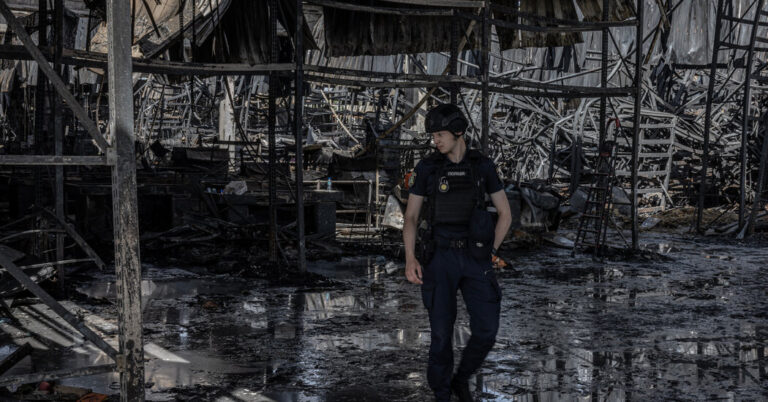Zelensky warns of new Russian offensive
A day after a Russian missile strike on a hardware store in Kharkiv, Ukraine, killed at least 16 people, local officials said, its president, Volodymyr Zelensky, said Moscow’s forces were regrouping for a new land offensive in the northeast.
Kharkiv has seen a sharp escalation in the ferocity of air attacks this month, forcing many people to flee. On Saturday, a second strike, occurring just hours after the attack on the supermarket, hit commercial infrastructure, injuring at least 25 people.
Far from the front lines, U.S. and allied intelligence officials track an increase in low-intensity sabotage operations in Europesaying these actions are part of a Russian campaign to undermine support for Ukraine.
The covert operations have mostly taken the form of arsons or attempted arsons targeting a wide range of sites, including a warehouse in England, a paint factory in Poland, homes in Latvia and an Ikea store in Lithuania. People accused of being Russian agents have also been arrested for planning attacks on U.S. military bases.
Hamas fires rockets into central Israel
Hamas launched a barrage of rockets yesterday afternoon, air warning sirens triggered in Tel Aviv area for the first time since at least the end of January. The attack showed that the group retained some long-range missile capabilities.
The Israeli military said at least eight rockets were fired from the town of Rafah in southern Gaza, where Israeli forces are advancing. No major damage was immediately reported. Israeli emergency services said two women were lightly injured while fleeing to an air raid shelter.
In Rafah: Hours after Hamas rocket attack, Israeli airstrike on makeshift tent camp for displaced Palestinians killed at least 35 people, said the Gaza Ministry of Health. The Israeli military said its operation targeted a Hamas compound. The Times was not immediately able to confirm details.
Ceasefire talks: Officials said negotiations could restart next weekafter a meeting in Paris between the heads of the American and Israeli intelligence services and the Prime Minister of Qatar.
Landslide in Papua New Guinea kills hundreds
More than 48 hours after a landslide hit a densely populated region of Papua New Guinea with boulders the size of shipping containers, a UN official in the country said: at least 670 people are believed to have died.
The landslide occurred around 3 a.m. Friday, while many residents were sleeping. As of Sunday afternoon, the land was still sliding, rocks were falling and the ground was cracking from increased pressure and flowing groundwater, hampering search and rescue efforts and forcing residents from their homes.
NO MORE NEWS
For generations, residents of Collyweston, a village in central England, have passed down the story of a grand Tudor palace that was home to Henry VIII’s grandmother. A group of dedicated locals have unearthed parts of the palace.
Lives lived: Richard Sherman, who was part of the team of songwriters who gave the world numbers like “Supercalifragilisticexpialidocious” and “It’s a Small World (After All),” has died. He was 95 years old.
CONVERSATION STARTERS
SPORTS NEWS
Manchester United, 2, Manchester City, 1: Erik ten Hag is right win the FA Cup.
Remembering Grayson Murray: THE two-time PGA Tour winner committed suicide at age 30.
Interview with Jelena Ostapenko: Handshakes, electronic calls and Roland Garros.
ARTS AND IDEAS
The subtlety of subtitles
Subtitles used to be a barrier for American viewers, at least outside of arthouse theaters. But hits like “Parasite,” “Squid Game” and “Shogun” demonstrated the move away from dubbing. Asian and Asian American filmmakers show how subtitles add more nuance to stories.
Lulu Wang’s Prime series “Expats” is set in Hong Kong and has parts in Cantonese, Mandarin, Tagalog, Punjabi and English.
The fifth episode notably highlights the subtlety of the subtitles. When the focus shifts from Hong Kong’s wealthy English-speaking expats to the mostly Filipino domestic workers who maintain the elite’s homes, the sudden prominence of Tagalog is a gateway into their inner lives – and a moment to savor for viewers who know the language.
That’s all for today’s briefing. Thank you for spending part of your morning with us, and see you tomorrow. -Justin
You can reach Justin and the team at briefing@nytimes.com.


